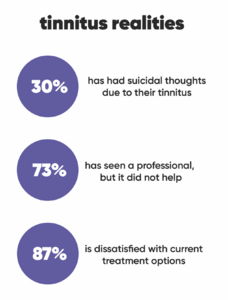That it can affect anyone, at any time, for relatively benign or even unknown reasons. You can list them: a concert, a cold, an ear infection, covid, MS, SSRI use, Advil use, a car accident, headphone use, etc. You can use real people's stories of their onset. I would go with the most ordinary to appeal to the fact that you don't have to be doing anything crazy to get it. For example, getting the flu, or walking outside your house and a train horn goes off, or my story with my own baby screaming near my ear. And highlight how you're stuck with it. Forever. You have to play on their emotions. The biggest thing that bugs me is that the first thing you read is if affects like 20% of the population but only 2% have it affect their life. That's it - your mind has already dismissed it as no big deal, it will never affect you, you don't have to worry about it or care. That seems like such a small number of people - and never you.
Some insight into how it causes suffering would be ideal. Highlighting how there is no relief, even temporarily. Comparing it to something they are familiar with: you can't just pop an Advil like with a headache, or just ice and rest like with a sprain, or even just lie in the dark and wait for it to pass like a migraine. It. Never. Stops. Also, something like example scenarios: "You're taking a nice hike in the forest, with the birds chirping and the bees buzzing and the river rushing in the distance. Peaceful, except over it all is a loud beeeeeeeep. And it never ends. You can't escape it. You try to cover your ears to make it stop but that just makes it louder. You will never hear anything without the beeeep again." Or "You're tired after a long day at work. You lie down in bed looking forward to that rejuvenating sleep. You turn off the lights; it's quiet. But with tinnitus, it disrupts these peaceful moments. It robs you of the ability to relax. Because now all you hear as you try to go to sleep is a beeeep that never ends. You can't escape it, you can't turn it off. There are no treatments to alleviate it, even just temporarily. All you can do is listen to the beeeep. Forever. You will never experience silence again." Or even "You're trying to meet a deadline at work, but your office is right next to the break room. People are playing music, talking, laughing, the microwave is going off, and the noise is getting overwhelming. You can't concentrate, you're getting a headache; you just need a second to step outside into a quiet hallway to think. Except you can't. Because all that noise is tinnitus, it's in your head, and there is no escape. There's no relief. No treatment. Just you and the noise that will never turn off."
Maybe that's a bit too depressing but that's the reality that we live with. Even for those of us who do end up dealing with it better. But in order for people to understand and care, they have to get it straight.

 Member
Member Director
Director